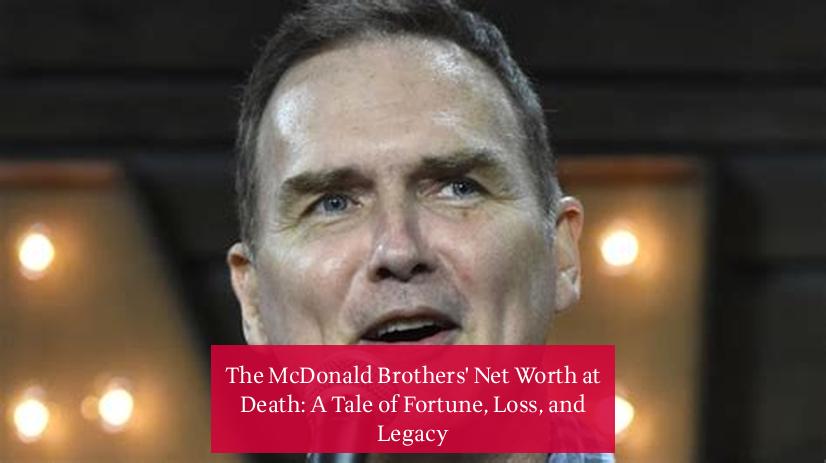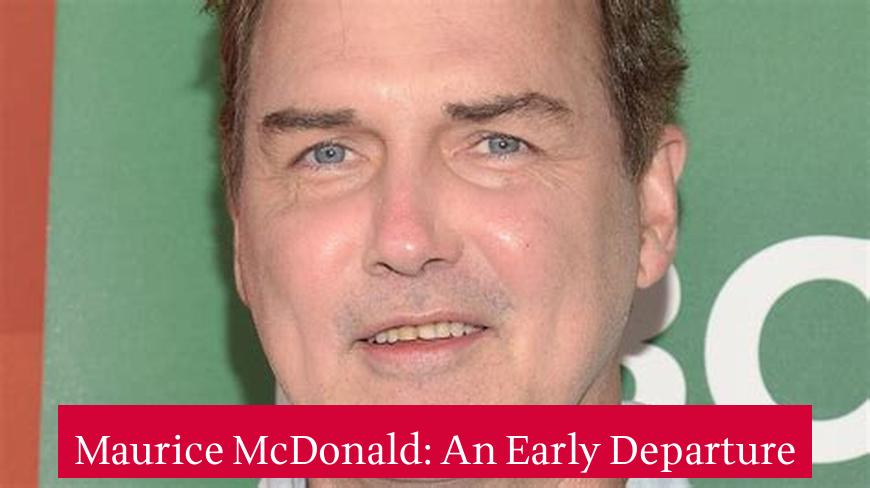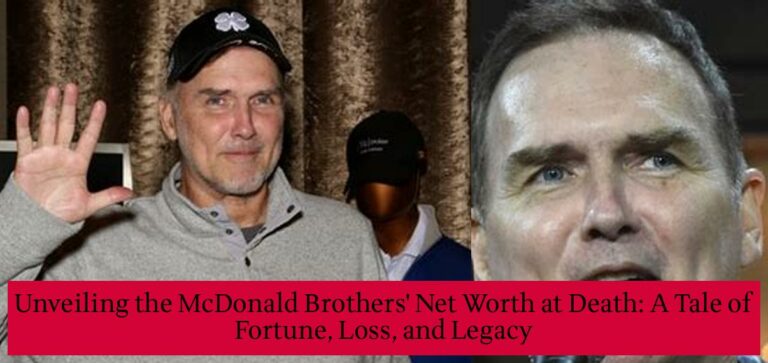Unveiling the McDonald Brothers’ net worth at the time of their passing is like opening a time capsule of fortune, loss, and legacy. The story behind their handshake deal, the rise of Ray Kroc, and the lack of legal protection serves as a cautionary tale for aspiring entrepreneurs. Join us as we delve into the captivating saga of the McDonald brothers’ legacy and the billion-dollar empire they unwittingly helped build.
Key Takeaways
- Ray Kroc’s net worth at the time of his death in 1984 was estimated at $600 million.
- Richard McDonald’s net worth at the time of his death in 1998 was estimated at $1.8 million.
- The McDonald brothers agreed to a “handshake” deal for 1% royalties of the revenues Kroc would make, but this deal was never honored.
- Kroc bought the company from the McDonald brothers in 1961 for $2.7 million, ensuring each brother received $1 million after taxes.
- Ray Kroc’s third wife inherited nearly $500 million when he died in 1984, and willed around $3 billion upon her own passing in 2003.
- Ray Kroc grew McDonald’s to such an extent that his net worth was estimated at over $500 million at the time of his death in 1984.
The McDonald Brothers’ Net Worth at Death: A Tale of Fortune, Loss, and Legacy

The McDonald brothers, Richard and Maurice, are synonymous with the iconic fast-food empire that bears their name. Their story is one of innovation, perseverance, and ultimately, a bittersweet end. While they played a pivotal role in the creation of McDonald’s, their financial fortunes took vastly different paths from that of the company they founded.
Richard McDonald: A Humble Legacy
Richard McDonald, the elder of the two brothers, passed away in 1998, leaving behind a modest net worth of $1.8 million. This stark contrast to the billions generated by McDonald’s highlights the disconnect between the brothers’ initial stake in the company and its subsequent growth under Ray Kroc’s leadership. Despite their handshake deal with Kroc for 1% royalties on future revenues, the brothers were unable to secure their fair share of the company’s success.
Maurice McDonald: An Early Departure

Maurice McDonald, the younger brother, passed away in 1971, leaving no known will or significant assets. His untimely demise at the age of 69 from heart failure further underscores the brothers’ financial struggles. While they had initially enjoyed the fruits of their entrepreneurial venture, their inability to maintain control of the company ultimately led to their financial downfall.
Ray Kroc: The Architect of a Billion-Dollar Empire
In stark contrast to the McDonald brothers, Ray Kroc, who purchased the McDonald’s franchise from them in 1961, amassed a vast fortune. At the time of his death in 1984, Kroc’s net worth was estimated at $600 million, a testament to his business acumen and the exponential growth of McDonald’s under his stewardship. His legacy as the driving force behind the fast-food giant overshadows the contributions of the McDonald brothers, who faded into obscurity as their creation soared to unprecedented heights.
Celebra Talks — Robert Kardashian Net Worth 1995: Unveiling the Legacy and Financial Journey of a Remarkable Figure
The Legacy of the McDonald Brothers: A Mixed Bag
The McDonald brothers’ legacy is a complex one, marked by both triumph and disappointment. They played a crucial role in the early development of McDonald’s, introducing the innovative concepts of the Speedee Service System and the assembly line approach to food preparation. However, their inability to protect their interests in the face of Kroc’s shrewd business tactics ultimately cost them their fortune.
The Handshake Deal: A Broken Promise
The handshake deal between the McDonald brothers and Ray Kroc, which entitled them to 1% of the future revenues of McDonald’s, is a classic example of a verbal agreement gone wrong. Despite the brothers’ insistence that such an agreement existed, they were unable to provide concrete evidence to support their claim. This lack of documentation allowed Kroc to renege on his promise, leaving the brothers with a fraction of the wealth they had helped create.
Kroc’s Business Savvy: A Lesson in Entrepreneurship
Ray Kroc’s business acumen is undeniable. He recognized the potential of the McDonald brothers’ concept and leveraged his salesmanship and financial resources to transform it into a global empire. His ability to negotiate favorable terms for himself, including the buyout of the McDonald brothers, demonstrated his shrewdness and entrepreneurial spirit.
The Brothers’ Lack of Legal Protection: A Cautionary Tale
The McDonald brothers’ failure to secure a formal written agreement with Kroc highlights the importance of legal protection in business dealings. A well-drafted contract would have safeguarded their interests and prevented the financial setbacks they ultimately faced. Their story serves as a cautionary tale for entrepreneurs who may underestimate the significance of legal documentation.
Discover: Chadwick Boseman Net Worth at Death: A Legacy of Talent, Impact, and Enduring Influence
The McDonald Brothers’ Story: A Cautionary Tale
The story of the McDonald brothers is a cautionary tale about the importance of protecting one’s business interests. It highlights the risks of relying on verbal agreements and the need for clear legal documentation. While the McDonald brothers’ legacy is forever intertwined with the fast-food giant they created, their financial misfortunes serve as a reminder of the challenges and pitfalls that entrepreneurs can face.
Did the McDonald brothers receive their royalties?
The brothers agreed to a “handshake” deal for 1% royalties of the revenues Kroc would make, but this deal was never honored.
How much money did each of the McDonald brothers receive?
Kroc bought the company from the McDonald brothers in 1961 for $2.7 million, ensuring each brother received $1 million after taxes.
How much money did Ray Kroc have when he died?
At the time of his death in 1984, Ray Kroc’s net worth was estimated at $600 million.
Who inherited Ray Kroc’s fortune?
Ray Kroc’s third wife inherited nearly $500 million when he died in 1984, and willed around $3 billion upon her own passing in 2003.
